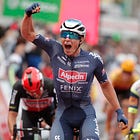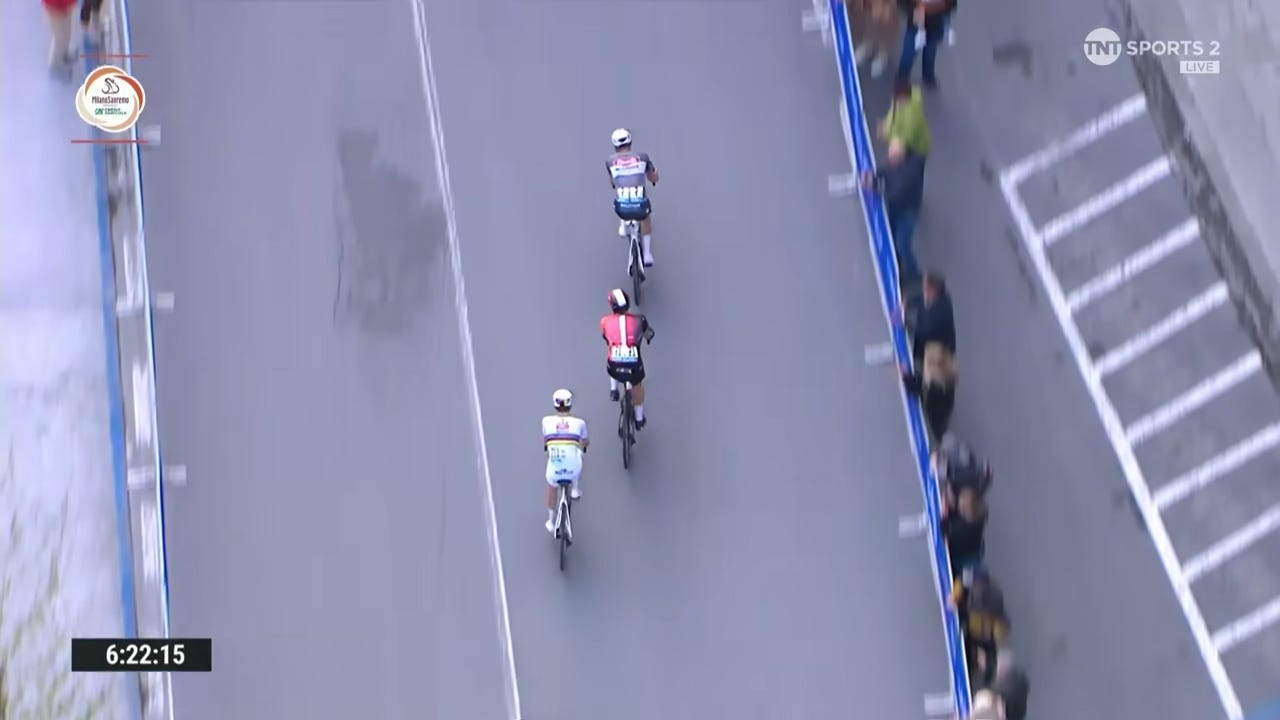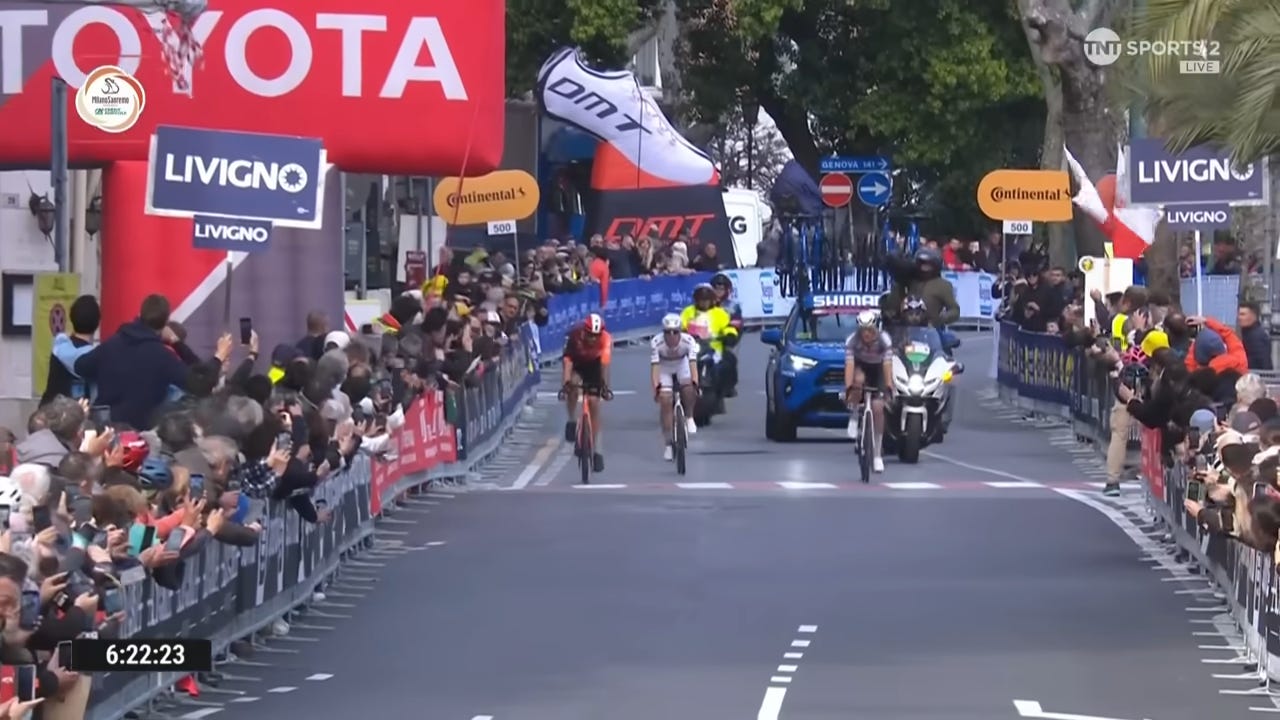How Milan-San Remo Was Won and/or Lost, 2025
The dudes try something novel: Going from two hills out
We’re fast approaching a point in time—if we’re not there already—when Tadej Pogačar makes cycling boring. In my lifetime, there’s never been a rider so dominant and so versatile. The Greatest of All Time discussion starts with Eddy Merckx; I’ve compared Merckx to Babe Ruth before, and I’ll repeat the comparison here because it fits so perfectly.
The sport has evolved to a point where no one can match Merckx’s exploits number-for-number. Concurrently, enough time has passed that Merckx has passed into legend. Among the real men, the flesh and blood, Pogačar is the greatest I’ve ever seen.
And even if I do one day get sick of Pogačar, I’m grateful for this: He’s interesting. Lance Armstrong and Chris Froome were just as dominant in their own way, but they pursued the grand tours—in Armstrong’s case, the Tour de France alone—to the exclusion of all other goals. I’m sure that if he wanted to, Pogačar could win five or seven or 10 Tours de France. Indeed, he might.
But that’s not how he builds his calendar, or how he trains, or how he races. He values stage wins and animates the race in a way Froome and Armstrong never did. And he values the classics just as much as stage races.
Pogačar, now 26 years old and in his seventh World Tour season, is out to win everything. He wants La Flèche Wallonne and Strade Bianche and Tirreno-Adriatico, sure.1 But there are nine races that stand head and shoulders above the rest in terms of prestige: the three grand tours, the five monuments, and the world road race championship.
And he races like he knows that only Merckx has won all nine.
Pogačar has won six so far: the Tour de France (three times), the Giro, and the world championship. He won all three last year, completing the Triple Crown, a feat achieved by only Merckx and Stephen Roche before him. He bucked tradition by taking on the Tour of Flanders, a cobbled monument, in 2022. He finished fourth, then won it the next year.
He’s won Il Lombardia four years running and Liège-Bastogne-Liège twice. He can win these two races basically at will. The same with the Vuelta, which he’s only ever raced once, finishing on the podium with three stage wins in his first grand tour.
Just like the Giro last year, Pogačar can and will win the Vuelta—probably in dominant fashion—at his leisure. It’s just a matter of when.
That leaves two races. There’s Paris-Roubaix, the brutal granddaddy of cobbled classics, a race so inhospitable to skinny GC riders most never even attempt it. Pogačar is going to try it for the first time this year, and while I want to believe his bony ass is gonna get rattled off the road, I’ve learned not to underestimate the greatest cyclist I’ve ever seen. Just this morning, as I write, Velo published a column titled: Why Tadej Pogačar Is Likely to Win Paris-Roubaix.
Why not?
But Milan-San Remo? Pogačar has been unable to brute force it.
He first raced the Primavera in 2020, finishing 12th, in the second group on the road behind the breakaway duo of Julian Alaphilippe and Wout van Aert. He came back two years later, and once again ended up in the second group, this time fifth overall, behind Matej Mohorič’s suicidal descent.
In 2023, it was Mathieu van der Poel who won by going solo on the Poggio. Again, Pogačar was in the second group, finishing third in the sprint behind Filippo Ganna and van Aert.
Last year, Pogačar couldn’t shake van der Poel on the Poggio, and ended up third overall in a finishing group of 12 riders.
Here’s the paradox: Pogačar is among the best in the world at just about everything. Climbing, time trialing, short hills, sprinting, bikehandling, descending. The two things that make him great are his versatility and his ability to recover quickly, both within a single race and between stages.
Milan-San Remo doesn’t have enough hills close enough to the finish for Pogačar to climb everyone off his wheel. The decisive hill is neither steep nor long enough for him to dust all of his competitors. If he comes to the top of the Poggio, there are better descenders and better sprinters who can beat him in the final five kilometers. And before that hill, the race is so flat Pogačar would doom himself to failure if he tried to bumrush the peloton from 80 kilometers out.
Milan-San Remo is always decided on the Poggio. And while Pogačar could beat everyone on the Poggio, it’s not even a likelihood, let alone a sure thing.
So Pogačar did something novel on Saturday: Attack before the Poggio.
About 20 kilometers farther out than the Poggio is a nearly identical small hill, the Cipressa.
Attacks on the Cipressa never work, because between the two climactic hills there’s about 10 kilometers of flat road. The Cipressa isn’t big enough to completely blow the peloton up, and that 10 kilometers is always enough time for the peloton to reconstitute itself and chase down the escapee, or escapees, before the Poggio. In fact, this had happened earlier Saturday in Milan-San Remo Donne.
But when Pogačar goes solo, group cohesion collapses. He’s seen it dozens of times by now. So, knowing that the chances of winning on the Poggio were slim, Pogačar rolled the dice.
He almost dropped the whole field. Had he done so, he might have been able to make good his escape. Unfortunately, van der Poel was in the field. There aren’t many who can match Pogačar’s uphill acceleration, but van der Poel can. He can’t do it for long, but he can hang for a minute or two, which is all it takes to get from the attack point to the summit.
And there’s the problem. If Pogačar could drop van der Poel on the Cipressa, he could do it on the Poggio. In which case he wouldn’t have needed to bother with this long-range malarkey.
Instead, Pogačar ended up worse off than if he’d waited. He had 20 kilometers to roll through, dragging a rider who’s a better descender and a far, far better sprinter, and therefore entirely disincentivized to work.
And also Ganna. The big Italian was able to hang on, ish, on the ascent of the Cipressa, and yo-yo’d on and off the leading duo the rest of the way. Ordinarily Ganna would be the greatest breakaway ally one could ask for, but Pogačar and van der Poel had put him on the limit on the climb, and Ganna was so gassed he couldn’t have pulled through even if he’d wanted to.
But this is exactly what I’ve wanted someone, anyone really but especially van der Poel, to do to Pogačar for years: Call his bluff. Get over the hill with him and sit on his wheel. Make him do the work; to hell with breakaway cohesion. At Strade Bianche, Tom Pidcock was either too honorable, too foolish, or simply too far out to go Full Remora. And he got what he deserved: A distant second place.
Van der Poel wasn’t a complete mooch. He rolled through a few times, and every time he did I yelled “Get back in line you hyperactive little bastard!” at my TV.
But he freeloaded enough to come to the finale in good shape. By the end of the race, the chase fell apart,2 which allowed Pogačar and van der Poel to slow down and look each other over, which in turn allowed Ganna to huff and puff back up to the front.
And yet, as they came onto the final straight, van der Poel had connived to put himself in a position to lose.
You don’t want to be at the front in a three-up sprint. At this point, all three riders are going slowly enough that the draft isn’t exactly the issue. The problem is that if van der Poel launches from the front, Ganna and Pogačar would be able to read the move and accelerate just as quickly. Conversely, if Pogačar launched from the tail position, he could be up to speed and gone by the time van der Poel knows what’s going on. Especially if the trio is riding in the middle of the road, where van der Poel would have to look over both shoulders to see his competitors.
So when did van der Poel win the race? About seven or eight seconds later.
It’s as simple as that. He swung off to the left and Ganna didn’t stay in his wheel. Now, he can see Pogačar and Ganna.3 All things being equal, van der Poel smokes these two in a sprint, especially with Ganna as bushed as he was. And all things were now equal.
Van der Poel took the sprint fairly easily, underscoring the difficulty Pogačar will face if he wants the full set of monuments, and also the importance of making the big bad work. Pogačar is the best I’ve ever seen, but he can be beaten. You just have to put yourself in the right position.
Indeed, he’s won all three
Because, why wouldn’t it?
I’m not really sure what Pogačar was up to from here to the end; he hung back so far behind Ganna I don’t know how much slipstream effect he was going to get, and he’d given himself a handicap of maybe three or four bike lengths in the sprint.









I think MVDP has learned that in small-group finishes he's got a huge advantage if he can make it a standing-start sprint. See RVV and Paris Roubaix in 2021, where he approached the line with speed and Asgreen/Cobrelli were able to come off his wheel and outsprint him. Contrast that with MSR 2025 and RVV 2020. MVDP doesn't have the best sprint once the group is up to speed, but if it's about a sudden, violent 250m acceleration he's got the advantage, even if starting as first wheel.
Anyway, thanks so much for your coverage of MSR. It's my favorite one-day of the season, and I tend to agree with your points about Pogi potentially making things boring. I'm a massive Pogi fan, but going in my take was that unless Pogi went solo over the Cipressa, I'd root for someone else:
"If Pogi doesn’t make it over the Cipressa alone, then it’s time to move on. For a rider that has basically accomplished everything in the sport he’s wanted to - and is still only 26 - there’s something beautiful about MSR being the one race he so desperately wants but can’t crack. So if it isn’t a majestic, first-time-in-30-years attack over the Cipressa, I’d rather he fall short again. Let MSR become his chimera. Let the tension continue to build over the years. Let us watch the greatest cyclist of all-time struggle with at least one race, flounder for at least a few years more."
I think Pog was hanging back to get a run up to Ganna's wheel, surprise them both and get enough of a gap to hold to the finish. But, VDP thwarted it tactically, first, by swinging left and being fortunate that Ganna didn't follow, and then by jumping before Pog could. If VDP had played it by the book-- i.e. if you're on the front you wait as long as you can to sprint so no one has enough road to come around you-- Pog might have gotten enough of a jump to hold on. I think this was his only shot in this 3-up.
What Pog could have done differently, I think, is not work as much so Ganna would catch up sooner, then he and Ganna could have traded attacks and force MVDP to cover them until one of them got away.
The other thing that might have improved his chances is have someone like Del Toro blast up the Cipressa (at Pogi speed, just for less time) from the base. That would have done damage to MVDP and Ganna, but less to Pog that what he inflicted on himself with his attack. Then he would have been marginally fresher than the other two when he finally attacked. (i.e., behind Del Toro he'd have a brief draft that he didn't have by attacking solo; the team lead out he got from, iirc, Pollitt, just wasn't violent enough).
Really fun to watch this year!